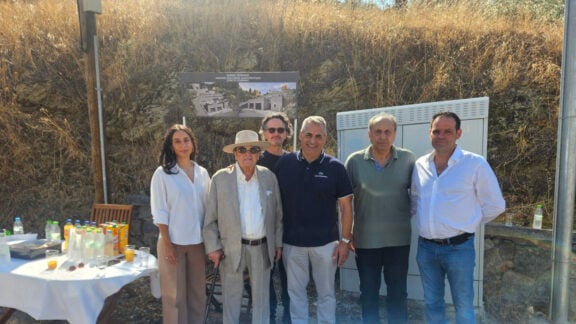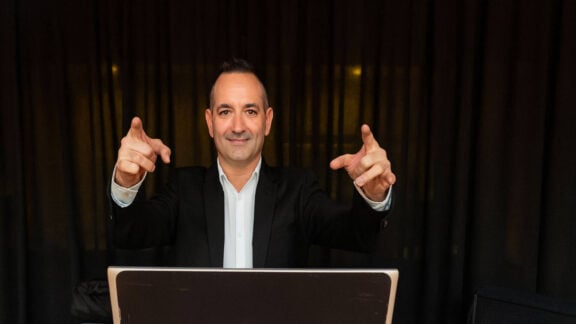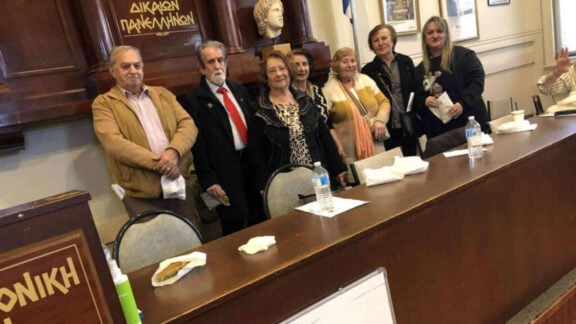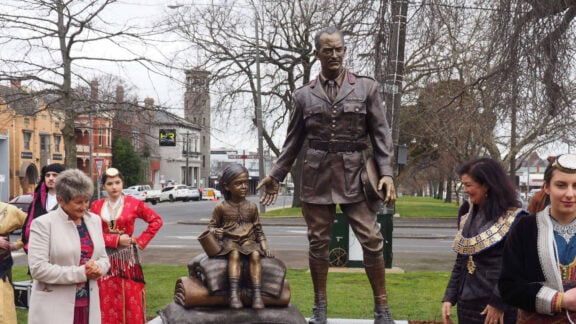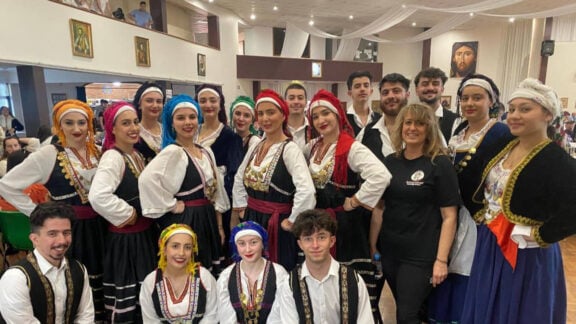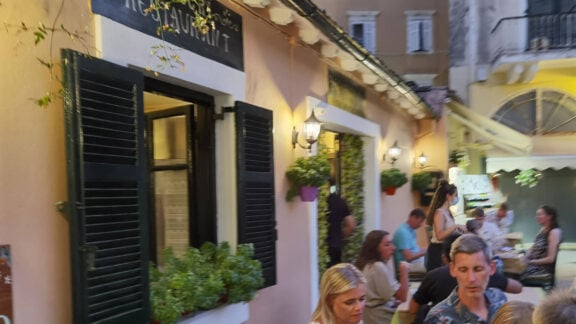The hair on the back of my neck stood up as my friends rose to their feet one by one and sang their hearts out to the Greek national anthem. Suddenly everyone in the packed London pub turned to look at us; it was the closing act of the wonderful London Games.
A tear formed and dropped on my cheek; my Greece, my Ellada, was the catalyst for this very moment and this epic event. There I was, sharing a moment in history with my Greek and British friends, and I was proud of my heritage in a moment that will never be forgotten. All the trouble that Greece has endured in recent times can momentarily be swept aside by the panache of a special occasion.
In the pub that night, Lazaridis, Dimitris, Alex, Charlie and Atif reminded me of what the Games can mean to various people. I was fortunate enough to have worked and lived through the most successful Games in history, Sydney 2000, and I also experienced the surreal party atmosphere of the Athens Games, with perhaps the greatest Opening Ceremony in history balanced by the biggest let-down with the Kenderis-Thanou drug scandal.
I have a photograph from 2004 with a group of about 10 of us sitting in a bar at the end of a great day of competition. Reflecting on the day, it meant something different to each of us. For Giorgios it was “about the spirit of being there as a volunteer, to give something back to my country”, while for my best friend George, it was “an experience like no other. I live in Japan and it was a surreal moment to be there”.
For my friend Theo it was a somewhat surreal experience; one minute we were in Ios at a day club and the next we were at the Olympic stadium in Marousi. Though it was no Sydney Olympic Stadium, there was something special about it, as though it held the dreams of athletes and spectators alike. You could feel the tremendous atmosphere, the spirit of being in Athens. People even cried when we pulled off the Opening Ceremony. I laughed when I noticed the lone builder walk out and hammer in one final bolt in the middle of the stadium; a reminder that Greece only just managed to pull off the Games. Thankfully Gianna Angelopoulos-Daskalaki was allowed to return by the ‘geniuses’ who exiled her in the first place; she and her team stunned us and the world by staging a rather spectacular Games.
As with the Games in Sydney, I went to four events. I went as an Australian, proud of Thorpey and all of our representatives. But I was just as proud to see all the Greek flags flying off buildings, taxis, cars and cafes. It was as patriotic as it was in Sydney, but unlike London, where the outward display of national pride was strangely lacking.
Athens no longer looked tired, she looked like a formidable sea of blue and white. This was the time I changed my opinion of Athens and fell in love with her. Every night we would sit in Plaka surrounded by thousands of people, singing, chanting, celebrating, loving.
As we all sat in the 1896 marble stadium, we watched the marathon runners finish their race, drawing the Games to a close. And again I felt that tear of pride welling up.
Standing across from the Olympic Village at what can only be described as the ‘astonishing achievement’ of Olympic Park, Dom, a friend of mine from London, and I looked on in awe.
“Billy, what do you think it’s like in there, what are they feeling?” asked Dom.
Little did I know that one year later I would become the Auburn Council representative of the village, helping to establish a Community Centre and plan the village’s future.
If you ever visit Sydney, be sure to pay a visit to Newington; every street in the village is named after an athlete, such as Spyridon Louis Street or Dawn Fraser Avenue.
But back to my mate Dom. One night after work we hung out at Olympic Park with 400,000 thousand others. We were watching the 200 metre semi-final replay on the massive screen, when we noticed Greek runner Kostas Kenderis coasting to victory.
We immediately suspected that this man would not do well in the final, as he was not exactly a household name. Boy were we wrong. When the final came around Kenderis quickly established a lead.
The crowd inside the stadium went wild, as he soon reached the finish line, arms outstretched as the winner. Dom (who may be a Greek in disguise) and I jumped for joy and ran around the park, hugging anyone we could.
What a moment in time. Two years later I ended up crossing paths with the Olympian on my island of Lesvos, where he was born and the fastest ship on the island has been named in his honour as ‘Kenderis.’
A real highlight of London was how well the host nation performed, Aussies like myself copping a lot of stick from the Poms having finally beat us at events. To see a country I adore and respect embrace the ideals of the Games is wonderful.
Thanks to the Games, a number of deprived London boroughs have been given a makeover, while an emphasis was placed on youth and disadvantaged members of society.
Having attended the Paralympics in 2000 and 2004, I have come to realise there are no more inspirational people on the planet than these athletes.
I’m lucky enough to call Paraylmpic champion swimmer Denise Beckwith a friend. A few minutes with Denise and you will feel truly blessed thanks to her champion qualities and charisma, encompassing the essence, the true spirit of the Olympic Games. All-inclusiveness, equality, fair play.
It all started in 776BC, when a group of athletes representing the ancient Greek city-states and kingdoms came together to enjoy a period of peace, friendship and sporting rivalry. Whether you were from Mytilene, Macedonia, Sicily or Cyprus, it didn’t matter as long as you were part of the Greek-speaking world. This was a chance to honour the gods as no victory was complete unless it had been ‘ordained’ by a higher being.
What the ancient Greeks created at Olympia was extraordinary. There are stories of Hercules attending, Alexander the Great winning every time given that the others were all too scared to attempt beating him, nude wrestling and plenty of local wine flowing.
With the ancient Hellenic world fragmented and never-ending wars, no such concept as a unified Greece existed. Yet the ancient Games were a great way to bring about peace and stability, athletes taking part as friends, rather than enemies, if only for a few months.
The mythology that relates to the Games dictates that Hercules created the concept of a rectangular stadium and was present at the first event, deciding to call the gathering ‘Olympic’, a name that has been upheld. An institution throughout antiquity, the event was held every four years during summer.
In AD426, the Byzantine Greek Emperor Theodosius II brought an end to the Games by ordering the destruction of ancient rituals; clearly he did not enjoy the nude wrestling.
Now for a little known fact: Athens held an interim, though unofficial, Games in 1906 and by all accounts was very successful with the Greeks, who finished fourth. Australia also competed and placed 20th. My city of heritage Smyrna even competed in the football competition, which was won by Denmark.
But before then, Evangelis Zappas, born in 1800 in the village of Labovo near Gjirokaster in Albania, was a wealthy land owner and merchant. His most significant achievement is the establishment of the Olympic Games from as early as 1856, seeking to create a modern Olympiad. He created a fund for an Olympiad in Greece which was then held in 1859 in Athens.
Baron Pierre de Coubertin, founder of the modern Games, was spot on to recreate the ancient tradition.
Being held every four years in different cities, it allows each host city to address issues that it may never have attended to.
The modern Greeks wanted to keep the Games in Athens every four years, which would defeat the concept of true internationalism and the opportunity for the rest of the world to take in the architectural delights of cities such as Barcelona or Atlanta. Who can forget the hospitable way Seoul opened its heart for athletes; most had never been to Asia. Or the excitement of going behind the Iron Curtain in Moscow in 1980.
China showcased itself to the world. London once again demonstrated how well an entire population can support an historical event and highlighted its glorious artistic side.
And I expect Rio will showcase how far Latin America has come, as a powerhouse continent; not to mention the wonderful and exciting culture of Brazil that we across the world have come to adore.
Once that is done, we can only hope they turn their attention to rooting out corruption and fighting poverty.
In closing, I can’t help but think that if Hercules was still around today, perhaps he, like myself, would contemplate letting a tear roll down his cheek.
For there is no better achievement than to bring people together to celebrate sport, culture and the arts.
Greece may be a lot of things, a financial basket case, a place for a tan, perhaps, but it is also the country which gave us the Games; an event that has given joy to billions, making even the most masculine a little sensitive.
* Billy Cotsis is the author of The Many Faces of Hellenic Culture.


